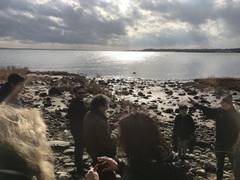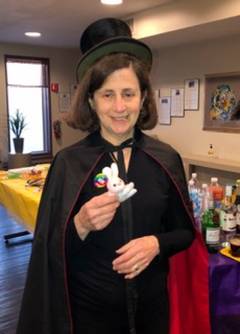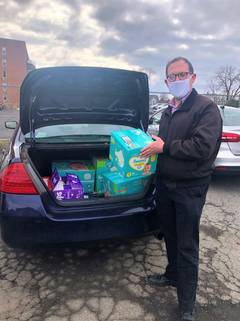Shavuot II/ Yizkor 5779: Past and Present
06/12/2019 04:29:46 PM
Jun12
| Author | |
| Date Added | |
| Automatically create summary | |
| Summary |
While the holiday of Shavuot in Jewish tradition is associated with the giving of the Torah, the initial meaning of the holiday was connected to the agricultural cycle in the land of Israel. In particular, Shavuot was associated with the beginning of the wheat harvest and the practice of bringing the first fruits from any field of wheat as an offering to the Temple.
The ritual was performed en masse by every single farmer in ancient Israel, who would tie a string around the first bud that emerged in his field. He would then bring a token amount of the first fruits he had marked to Jerusalem in a basket and hand it to a priest. The farmer would then recite this precise declaration specified by the Torah:
“My father was a fugitive Aramean. He went down to Egypt with meager numbers and sojourned there; but there he became a great and very populous nation. The Egyptians dealt harshly with us and oppressed us; they imposed heavy labor upon us. We cried to the LORD, the God of our fathers, and the LORD heard our plea and saw our plight, our misery, and our oppression. The LORD freed us from Egypt by a mighty hand, by an outstretched arm and awesome power, and by signs and portents. He brought us to this place and gave us this land, a land flowing with milk and honey. Wherefore I now bring the first fruits of the soil which You, O LORD, have given me.”
This passage may sound familial because it is the centerpiece of Magid, the retelling of the story of Passover during the seder, in which this passage is commented on in detail. But the original setting of this text was not Passover but Shavuot and the ritual of bringing the first fruits. This offering represented the farmer's gratitude for coming in to the land and for the food it produced.
But notice what this declaration does. It gives a concise summary of the Jewish narrative, starting with the words Arami Oved Avi�"my father was a fugitive or wandering Aramean, referring either generally to the most ancient ancestors of the Israelites or specifically to Abraham or Jacob.
Then, this narrative about the past is connected to the present, to the here and now, to the basket of first fruits that came out of the ground this season. The present is understood in terms of the past. The life of the farmer is understood in terms of the life of his distant ancestors. Being here is connected to once being somewhere else. Being free is connected to once being a slave.
I would suggest that we make a very similar move at Yizkor, when we connect our present with our past. Through the annual cycle of holidays, we pause to remember our dearly departed relatives and friends who are no longer with us for these joyous occasions.
Yizkor gives us an opportunity to understand our lives in the contexts of those who came before us. Our stories, like the ancient Israelite farmer's, do not begin with ourselves, but with Avi�"with the stories of our ancestors, siblings, spouses, friends and children, those who are no longer with us in life, but whose lives impacted us in ways we can understand and in ways that we cannot.
Shavuot affirms this truth in other ways. When we celebrate receiving the Torah, we are reminded that our lives, our stories, are much bigger than just what we have personally experienced. Our lives are part of a much larger narrative that begins with that same wandering Aramean and goes through Egypt to Sinai to the land of Israel to the Diaspora, all through the generations and centuries until today.
All along we've had the Torah as our guide and inspiration. Its words and stories have shaped our lives in ways we understand and ways we cannot. Our own immediate ancestors added their insight to the collected body of Jewish wisdom and passed it to us. We pause now to remember what we learned from them and how their stories impact us.
But if Shavuot teaches us anything, it is that our stories come with obligations. That ancient farmer didn't just recall the story of his ancestors. The story prompted him to action, to bringing the first and the best of his fruit as an offering to God. So too do our ancestors' stories obligate us: to live into and up to their highest values and aspirations, to make the world a better place, to pass their stories and traditions on to the next generations so that sometime in the future, we can be sure that our descendants will say Yizkor for us and recall us with fondness and with love.
Yizkor, on Shavuot and every holiday, locates us in this nexus of past and present, with all of the obligations we have to both the past and the future.
I conclude with a poem by Rabbi Harold Schulweis called “Backwards and Forwards.”
We remember backward
We live forward.
Looking backward, we recall our ancestry.
Looking forward, we confront our destiny.
Looking backward, we reflect our origins.
Looking forward, we choose our own paths.
Looking backward alone we turn memory into a pillar of salt,
yielding neither fruit nor flower.
Looking forward alone, we rob ourselves of history,
The significant knowledge that informs us whence we have come.
Backward and Forward �" the two tenses “was” and “will be,”
Shaping the present tense.
Yizkor, deepening our roots and widening our horizon.
Yizkor, remembering that we are a tree of life
Holding on and holding to,
Not letting go, willfully forward.
Mon, October 27 2025
5 Cheshvan 5786
Photo Gallery
Photo Albums
Mon, October 27 2025 5 Cheshvan 5786
Upcoming Events
All Events
-
Thursday ,
OctOctober 30 , 2025Coffee with the Rabbi
Thursday, Oct 30th 8:00a to 9:00a
Start your morning with some caffeine and casual or meaningful conversation! Join Rabbi Goldberg for a Coffee Chat! Stop by Rye Ridge Starbucks any of the following Thursdays, between 8-9am: June 12 and 26 July 10 and 24 August 7 and 21 September 4 and 18 October 16 and 30 November 6 and 20 December 4 and 18 -
Saturday ,
NovNovember 1 , 2025Dror Israel Shabbat
Shabbat, Nov 1st 11:30a
Dror Israel Shabbat Dror Israel’s Mirit Sulema, along with two leaders of the Arab Youth Movement NOAL, Tal Tunik and Shadi Habiballa, will speak during a Kiddush lunch about their important work with Arab Israeli youth and bringing Jewish, Arab, and Druze youth together. Saturday, November 1st, approx. 11:30am KTI Social Hall "We eat together, laugh together. We talk about what we think of each other, and what will help bring peace.” RSVP Appreciated -
Saturday ,
NovNovember 1 , 2025KTI Gala - A November to Remember Digital Journal
Motzei Shabbat, Nov 1st 7:00p to 10:00p
-
Saturday ,
NovNovember 1 , 2025KTI Gala - A November to Remember
Motzei Shabbat, Nov 1st 7:00p to 10:00p
Saturday, November 1, 2025, 7:00 PM - 10:00 PM Harrison Meadows -
Wednesday ,
NovNovember 5 , 2025Rabbi, May I? Modern Responsa
Wednesday, Nov 5th 10:00a to 11:30a
Wednesdays, 10 - 11:30 AM, KTI Library Ever since Abraham’s famous argument with God, Judaism has been full of debate. Moses and Korah, David and Nathan, Hillel and Shammai, the Vilna Gaon and the Ba’al Shem Tov, Spinoza and the Amsterdam Rabbis . . . the list goes on. No wonder that Judaism cherishes the expression machloket l’shem shamayim, “an argument for the sake of heaven.” Beyond their historical importance, what makes these disputations so compelling is that nearly all of them, regardless of their epochs, are still being argued. The parade of characters spanning three millennia of biblical, rabbinic, and modern disputation reflects the panorama of Jewish history with its monumental political, ethical, and spiritual challenges. This series will examine Jewish responses to exile from the biblical period to our modern day. Considering texts from all genres of Jewish literary creativity, we will explore how the realities and iterpretaions Join as we re-open these timeless debates that lead us to the core of 3,000 years of Jewish conversation. • Justice: Abraham vs. God (October 19) • Holiness and Authority: Moses vs. Korah (November 9) • Inclusion: The Five Daughters vs. the Twelve Tribes (November 30) • Accountability and Morality: David vs. Nathan (December 21) • Resistance: Ben Zakkai vs. the Zealots (January 18) • Law: Hillel vs. Shammai (February 15) • Spirituality: The Vilna Gaon vs. the Baal Shem Tov (March 15) • Boundaries: Spinoza vs. the Amsterdam Rabbis (April 19) • Religious Evolution: Geiger vs. Hirsch vs. Frankel (May 10) • Zionism: Herzl vs. Wise (May 31)
Privacy Settings | Privacy Policy | Member Terms
©2025 All rights reserved. Find out more about ShulCloud






